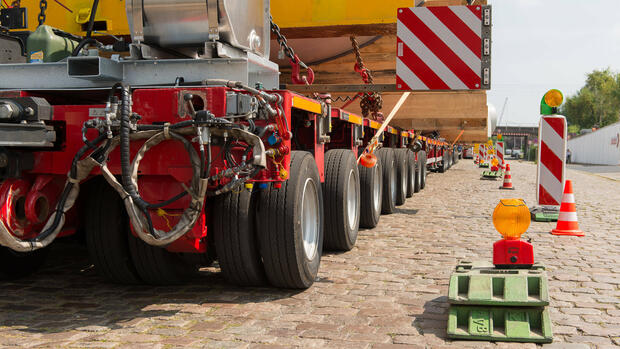Transporters have long complained that it takes far too long to approve a transport.
(Photo: IMAGO/Zoonar)
Berlin The National Regulatory Control Council is urging Chancellor Olaf Scholz (SPD) to conclude a pact with the federal states by the end of the year at the latest in order to speed up planning and approval procedures. “In my view, the federal and state governments must come to an agreement by the end of the year if we still want to achieve the much-vaunted Germany pace in this legislature,” said Chairman Lutz Goebel of the Handelsblatt.
The acceleration of the procedures is “overdue”, he explained. “Whether maintenance or new construction, whether energy transition or digitalization, the modernization of our infrastructure and the investment activity of our economy must no longer be slowed down by bureaucratic requirements.”
Chancellor Scholz himself has declared it a central task of the self-proclaimed “progress coalition” of SPD, Greens and FDP to change the rules in such a way that the procedures only take half as long as before.
In order to achieve the “Germany pace”, the federal government wants to conclude a “pact” with the states, as stated in the coalition agreement. This should include so-called federal acceleration agencies, which the states and municipalities may use, more staff, digitized processes and more capacity in the courts.
The first talks with the federal states already took place in the spring of 2022. However, to date there has been no agreement, which the prime ministers have complained about at several conferences with the federal government. The delay is “questionable,” said Goebel. But it also shows “how complex the problem is”.
Control Council proposes concrete measures for faster procedures
The main criticism from the federal states is that the federal government has primarily formulated test orders, but hardly any concrete effective measures. The Regulatory Control Council also criticizes this. According to a 16-page position paper that the Control Council sent to the Chancellery last week, “concrete measures” have “hardly been identified so far”. It is available from the Handelsblatt.
Chancellor Scholz has declared it one of the central tasks of the self-proclaimed “progress coalition” to change the rules so that the procedures only take half as long as before.
(Photo: dpa)
In it, the independent advisory body of the federal government calls for no further tightening of European rules. For example, the federal government should examine which industrial plants really require extensive approval procedures and where a simplified procedure for construction is sufficient.
The Council, like many experts, also recommends introducing a deadline. “Nowadays, application documents have to be kept up to date until they are approved, which repeatedly requires extensive nature conservation and environmental law checks. This could be avoided by introducing cut-off date regulations,” the council concludes.
In addition, the Council advocates that the Federal Government advocates simplifications at European level that are currently not possible under EU law. This includes the provision that concerns must be raised by a certain deadline. These can no longer be brought in at a later point in time.
There is also potential for savings with large and heavy transports
In addition to proposals to restrict the right to take collective action, to shorten court proceedings, to rely on mediation procedures and to advance the standardization of procedures as well as digitized processes, the Council is paying attention to “indirect acceleration effects” in infrastructure projects.
As an example, the Council cites the approval of large-volume and heavy-duty transports. The transporters have been complaining for a long time that the approval of a transport takes far too long and, above all, at the motorway company in northern Germany, tens of thousands of applications are unprocessed. In May there was already a crisis meeting in the Federal Ministry of Transport in view of the problems.
The situation in the north is particularly problematic, as many transports have to head for the seaports to ship export goods. Other transports relate to the increasing number of wind turbines, which are intended to accelerate the expansion of renewable energies. The wind turbine manufacturer Enercon, for example, complains about approval times of up to 14 weeks and a number of turbines whose construction is delayed due to the long approval process.
In this context, the Council points to an absurdity in the procedure: Transports that are up to 15 centimeters smaller or up to five percent lighter than registered are still considered approved.
>> Read here: Tens of thousands of heavy loads are waiting for highway permits
If the transport turns out to be even smaller and lighter than planned, the transporter must obtain a new permit and may lose many more weeks before he can get the goods to the construction site. “The number of permits could be reduced if the dimensions specified in the permit were generally allowed to be undercut,” the council recommends.
More: Disrupted supply chains because of five centimeters – How Autobahn GmbH caused chaos
